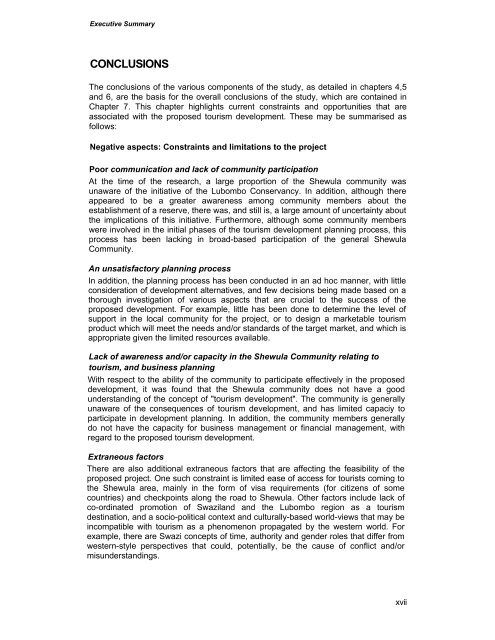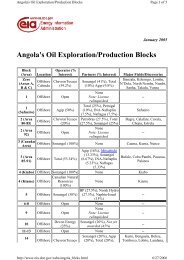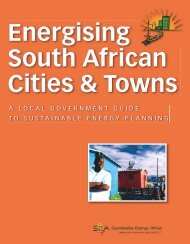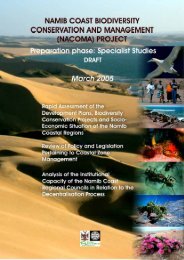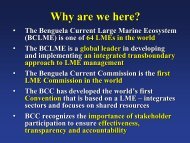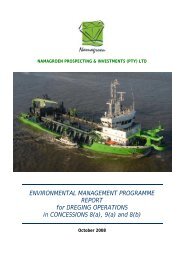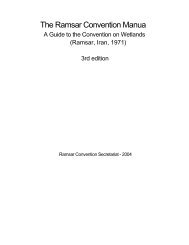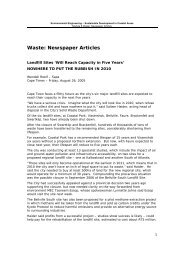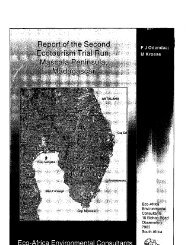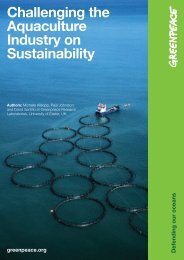Feasibility Study of Proposed Tourism Dev in Shewula, NE ...
Feasibility Study of Proposed Tourism Dev in Shewula, NE ...
Feasibility Study of Proposed Tourism Dev in Shewula, NE ...
You also want an ePaper? Increase the reach of your titles
YUMPU automatically turns print PDFs into web optimized ePapers that Google loves.
Executive Summary<br />
CONCLUSIONS<br />
The conclusions <strong>of</strong> the various components <strong>of</strong> the study, as detailed <strong>in</strong> chapters 4,5<br />
and 6, are the basis for the overall conclusions <strong>of</strong> the study, which are conta<strong>in</strong>ed <strong>in</strong><br />
Chapter 7. This chapter highlights current constra<strong>in</strong>ts and opportunities that are<br />
associated with the proposed tourism development. These may be summarised as<br />
follows:<br />
Negative aspects: Constra<strong>in</strong>ts and limitations to the project<br />
Poor communication and lack <strong>of</strong> community participation<br />
At the time <strong>of</strong> the research, a large proportion <strong>of</strong> the <strong>Shewula</strong> community was<br />
unaware <strong>of</strong> the <strong>in</strong>itiative <strong>of</strong> the Lubombo Conservancy. In addition, although there<br />
appeared to be a greater awareness among community members about the<br />
establishment <strong>of</strong> a reserve, there was, and still is, a large amount <strong>of</strong> uncerta<strong>in</strong>ty about<br />
the implications <strong>of</strong> this <strong>in</strong>itiative. Furthermore, although some community members<br />
were <strong>in</strong>volved <strong>in</strong> the <strong>in</strong>itial phases <strong>of</strong> the tourism development plann<strong>in</strong>g process, this<br />
process has been lack<strong>in</strong>g <strong>in</strong> broad-based participation <strong>of</strong> the general <strong>Shewula</strong><br />
Community.<br />
An unsatisfactory plann<strong>in</strong>g process<br />
In addition, the plann<strong>in</strong>g process has been conducted <strong>in</strong> an ad hoc manner, with little<br />
consideration <strong>of</strong> development alternatives, and few decisions be<strong>in</strong>g made based on a<br />
thorough <strong>in</strong>vestigation <strong>of</strong> various aspects that are crucial to the success <strong>of</strong> the<br />
proposed development. For example, little has been done to determ<strong>in</strong>e the level <strong>of</strong><br />
support <strong>in</strong> the local community for the project, or to design a marketable tourism<br />
product which will meet the needs and/or standards <strong>of</strong> the target market, and which is<br />
appropriate given the limited resources available.<br />
Lack <strong>of</strong> awareness and/or capacity <strong>in</strong> the <strong>Shewula</strong> Community relat<strong>in</strong>g to<br />
tourism, and bus<strong>in</strong>ess plann<strong>in</strong>g<br />
With respect to the ability <strong>of</strong> the community to participate effectively <strong>in</strong> the proposed<br />
development, it was found that the <strong>Shewula</strong> community does not have a good<br />
understand<strong>in</strong>g <strong>of</strong> the concept <strong>of</strong> "tourism development". The community is generally<br />
unaware <strong>of</strong> the consequences <strong>of</strong> tourism development, and has limited capaciy to<br />
participate <strong>in</strong> development plann<strong>in</strong>g. In addition, the community members generally<br />
do not have the capacity for bus<strong>in</strong>ess management or f<strong>in</strong>ancial management, with<br />
regard to the proposed tourism development.<br />
Extraneous factors<br />
There are also additional extraneous factors that are affect<strong>in</strong>g the feasibility <strong>of</strong> the<br />
proposed project. One such constra<strong>in</strong>t is limited ease <strong>of</strong> access for tourists com<strong>in</strong>g to<br />
the <strong>Shewula</strong> area, ma<strong>in</strong>ly <strong>in</strong> the form <strong>of</strong> visa requirements (for citizens <strong>of</strong> some<br />
countries) and checkpo<strong>in</strong>ts along the road to <strong>Shewula</strong>. Other factors <strong>in</strong>clude lack <strong>of</strong><br />
co-ord<strong>in</strong>ated promotion <strong>of</strong> Swaziland and the Lubombo region as a tourism<br />
dest<strong>in</strong>ation, and a socio-political context and culturally-based world-views that may be<br />
<strong>in</strong>compatible with tourism as a phenomenon propagated by the western world. For<br />
example, there are Swazi concepts <strong>of</strong> time, authority and gender roles that differ from<br />
western-style perspectives that could, potentially, be the cause <strong>of</strong> conflict and/or<br />
misunderstand<strong>in</strong>gs.<br />
xvii


